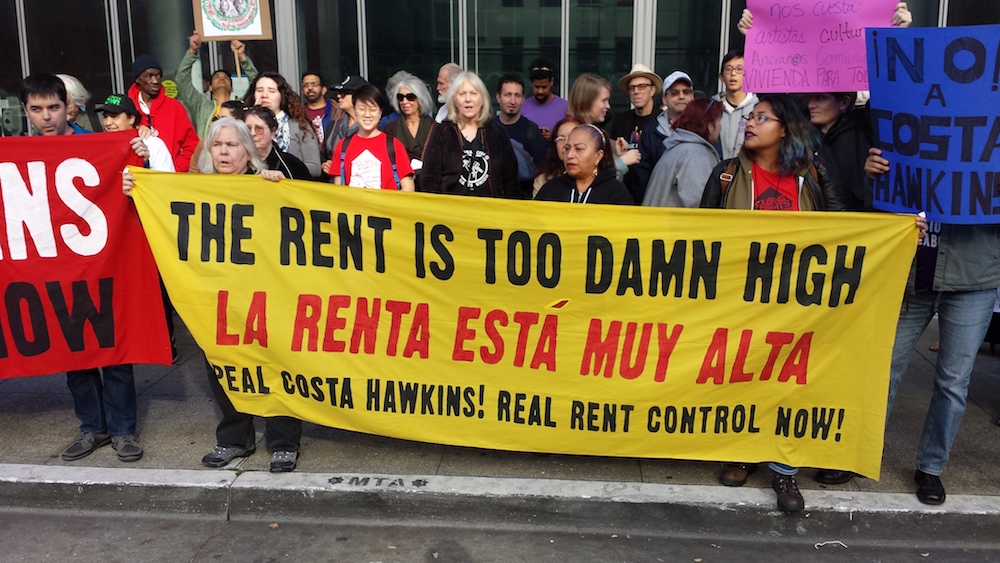To the Editor: Thanks for your piece today about the Small Business Commission. I have a couple of questions about this whole building thing that I’m hoping you could cover.
1) It seems that most cities are unhappy with Wiener’s buildathon law. Why aren’t they getting together to do some kind of lawsuit based on the state encroaching on local governments’ rights? If this was truly low-income housing that would be one thing, but it is clearly not, and I imagine most people support local autonomy.
2) Has there been any kind of audit of current available (as in unoccupied) units in San Francisco. Aren’t there over 1,000 units in Park Merced that aren’t rented out because they need work? There is something seriously wrong with the condos down at 3535 Wawona. They have been empty for years, as has the large retail space. I’m quite sure there are many more like this in the city. Let’s find out what we have before we start building more.

3) I’m tired of the mainstream press and housing pushers saying how the western side of the city keeps resisting new places. There are the above two, plus (below-market) Shirley Chisholm, plus the place on Irving going up now, plus senior low-income housing planned for the Great Highway. That seems like a lot in a couple of miles, and that’s not even talking about all the building in the Richmond.
4) There’s a condo monstrosity going up across the street from me at 45th and Judah. It is going up very, very slowly. It started at about the same time as the Shirley Chisholm project and that was completed and filled months ago. I imagine they’ve run out of money. If so, who is going to pay for all this new construction?
5) Why can’t the city or nonprofits or even for-profits buy these empty places and rent them out to low-income folks? It has got to be cheaper than new construction. But then they and their buddies’ pockets wouldn’t get lined I guess.
Thanks a lot.
Denise Selleck
Native San Franciscan
All good questions, Denise. I will do my best to answer them.
The issue of the state encroaching on local authority is complex, but in the end, I don’t think a lawsuit would be successful; the solution is going to have to be political. If people (and local officials) all over the state don’t like these laws, they can pressure their local legislators to change them—but they will be up against the real estate industry, which is one of the most powerful lobbying interests in Sacramento. There’s a reason the state strictly limits local rent-control laws, and every effort to repeal those limits has failed: Big Real Estate gives so much money to legislators, and has so much clout, that it’s hard to get any legislators to stand up for tenant and local rights.
When Dean Preston was a supervisor (before Big Tech and Real Estate put up massive amounts of money to oust him) he called for exactly what you are talking about: An audit of vacant apartments. It found that 40,000 units in the city are empty. Sen. Scott Wiener and his allies don’t seem to think that matters; building more, as opposed to forcing landlords to put those units on the market, is their only solution.
The city has also approved more than 50,000 housing units that remain unbuilt. That’s not because of Nimbys, or red tape, or anything else—it’s because the profits aren’t high enough in housing right now to get investors to put up the money for construction. Developers aren’t about building housing; their goal is to make money. Investors (and many large housing projects these days are financed by speculative capital) care only about returns. If you can make more money investing in AI, or crypto, or whatever is the flavor of the day, that’s where the money goes.
Once upon a time, regulated savings and loan associations loaned money for housing development at 6 percent interest (set by federal law). They paid 4 percent interest on savings accounts, and lived just fine on that margin.
Today, the banks are deregulated, and investors demand far more than 6 percent return; projects don’t “pencil out” at less than 10 or even 15 percent.
For years, in the 1980s and 1990s, progressives (who are often blamed for the housing crisis) did everything possible to demand that office developers also build housing for the new workers. But the return on investment for offices was higher than the ROI for housing, so that’s what the developers built.
The city could, indeed, buy these stalled projects; some, like Preston, have called for that repeatedly. The voters even passed a measure that set aside funds to buy up property, and Mayor London Breed refused to spend the money. Mayor Daniel Lurie isn’t spending it on housing acquisition, either.
Many years ago, when I was living at Fillmore and Hayes, my eight-unit building went on the market for $240,000. That’s $30,000 a unit. I called all the supervisors I could reach, and said: Why can’t the city buy this, and make it affordable housing?
Imagine: Eight units for $30,000 each. You could charge $125 a month rent and still pay the interest on city revenue bonds, and the place would be affordable forever.
Nobody responded.
I wonder if 40 years from now we’ll be looking back at those condos on 45th and Judah and asking: What the hell were we thinking?





